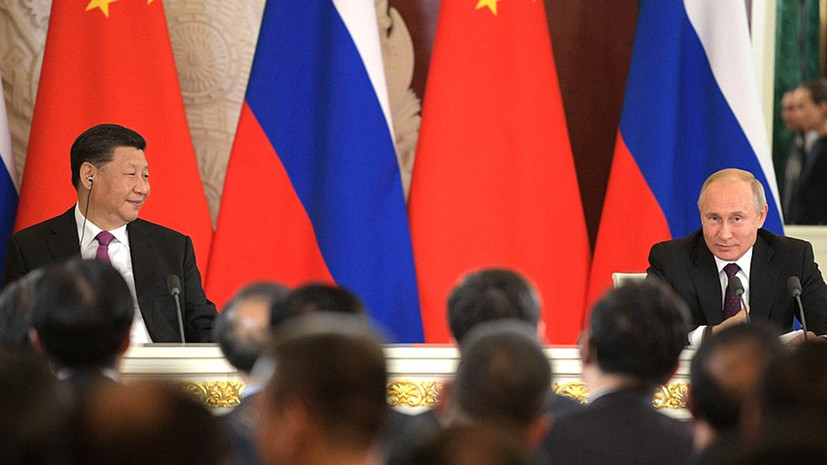From January to September 2022, the volume of mutual trade between Russia and China increased by 32.5% compared to the same period in 2021 and amounted to approximately $136.09 billion. Such data were published on Monday, October 24, by the General Administration of Customs of China.
According to the agency, in the first nine months of this year, exports of Chinese products to Russia increased by 10.3% and exceeded $52.24 billion. Moscow, meanwhile, increased the supply of goods to Beijing by 51.6%, to $83.85 billion.
“The observed dynamics is a direct consequence of how Russia is reorienting the export of its raw materials and goods from the West to the East, and above all to China.
First of all, we supply our energy resources to the PRC - oil, gas and coal, in which the Asian republic has a great need, ”Natalya Milchakova, a leading analyst at Freedom Finance Global, told RT.
As follows from the materials of the Chinese customs, from January to September, Russia supplied China with 64.26 million tons of oil for $44.06 billion. Over the year, the figure increased by 8.8% in quantitative terms and by 55.2% in monetary terms.
Russian coal exports to China roughly doubled year-on-year to $8.5 billion, while pipeline gas sales nearly tripled to $2.8 billion. updated the historical maximum, as previously reported in Gazprom.
“Gas exports to China are growing through the Power of Siberia gas pipeline under a bilateral long-term contract between Gazprom and CNPC (China National Petroleum Corporation. -
RT
).
Deliveries regularly go beyond the daily contract quantities,” the company noted.
© PJSC "Gazprom"
Thus, at the moment about 66% of Russian exports to China are energy products.
In addition, Moscow today is actively increasing the supply of food and agricultural raw materials, metals, wood and pulp and paper products, as well as chemical products to Beijing, Mark Goykhman, chief analyst at Teletrade, said in an interview with RT.
“China supplies us primarily with equipment, machines and vehicles.
These groups of goods account for almost two thirds of Russian imports from China.
In addition, the scale of purchases of Chinese products of the textile, footwear and chemical industries, metal products and a number of consumer goods is high.
These deliveries are also increasing largely due to a decrease in imports from western directions,” Goykhman added.
Behind the West
Recall that since the end of winter, the United States, the EU countries and some other states continue to impose new economic sanctions against Russia.
This is how the West reacts to the conduct of a military special operation in Ukraine.
In total, more than 12.66 thousand restrictions have already been imposed on Moscow (9.97 thousand of them since February 22), as evidenced by the materials of the global database for tracking sanctions Castellum.AI.
Restrictions, in particular, affected the banking industry, the energy sector, aviation and trade.
At the same time, almost half of Russia's gold and foreign exchange reserves (worth $300 billion) were frozen, and many international companies announced their withdrawal from the Russian Federation.
According to experts from the Center for Strategic Research, about 130 major foreign organizations have announced their intention to leave the Russian market.
At the same time, business from other countries, including China, gradually began to occupy the vacant niches, Artyom Deev, head of the analytical department at AMarkets, told RT.
“Entrepreneurs from the Middle Kingdom always take advantage of the moment to expand their presence in the market they need.
In this case, the combination of sanctions and the need to look for alternatives to critically needed imports only strengthens China’s position as our main trade partner,” Deev emphasized.
In addition, as experts note, China, along with other friendly countries, is now participating in parallel imports.
We are talking about the import of original foreign products into Russia without the consent of the copyright holders.
In response to Western sanctions, the government approved the corresponding initiative back in March to provide the domestic market with demanded goods.
“Every month, the volume of parallel imports to Russia grows by an average of 12%.
Supplies come from friendly countries in the South and the Far East, including, of course, China.
It is no coincidence that the Russian merchant fleet is reorienting its activities from the western direction to the east, including the Far East,” Natalya Milchakova noted.
Dry cargo ship "Igor Ilyinsky"
Legion Media
© Sergey Yakovlev
The expansion of trade cooperation with China in many ways helps Russia overcome the sanctions pressure and allows the economy to quickly adapt to new conditions.
Alexander Razuvaev, a member of the Supervisory Board of the Guild of Financial Analysts and Risk Managers, shared this opinion with RT.
“Thanks to growing cooperation, we can not worry about export earnings and budget filling even in the face of constantly emerging restrictions from the West.
Of course, we provide China with good discounts on energy resources, but the prices still remain favorable for us.
As for imports, some private companies in China are afraid of increased cooperation with Russia for fear of falling under sanctions.
However, most players are willing to take risks, wanting to enter the large Russian market,” Razuvaev explained.
According to analysts, under the current circumstances, the volume of mutual trade between Russia and China will continue to grow in the foreseeable future.
So, according to Mark Goykhman, by the end of 2022, the trade turnover may exceed $180 billion for the first time in the history of observations. At the same time, the Russian authorities expect to achieve even higher rates in the near future, as President Vladimir Putin previously stated.
“Our strategic partnership is developing - and developing very successfully ... Apparently, we will indeed soon reach $ 200 billion in turnover, as we wanted,” Putin noted in early September at a meeting with the chairman of the Standing Committee of the National People's Congress Li Zhanshu .

